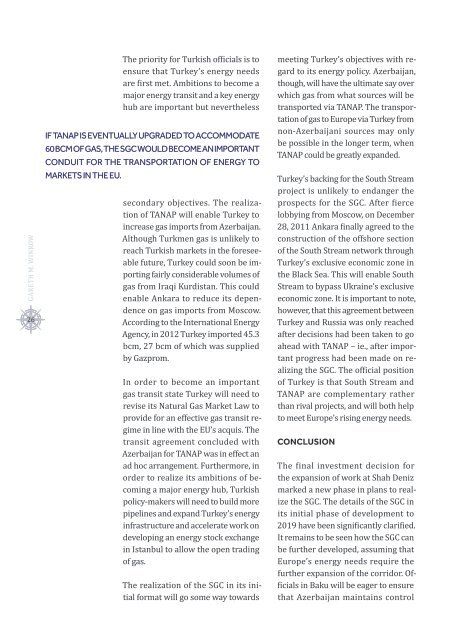Caspian Report - Issue 06 - Winter 2014
Create successful ePaper yourself
Turn your PDF publications into a flip-book with our unique Google optimized e-Paper software.
GARETH M. WINROW<br />
26<br />
The priority for Turkish officials is to<br />
ensure that Turkey’s energy needs<br />
are first met. Ambitions to become a<br />
major energy transit and a key energy<br />
hub are important but nevertheless<br />
IF TANAP IS EVENTUALLY UPGRADED TO ACCOMMODATE<br />
60 BCM OF GAS, THE SGC WOULD BECOME AN IMPORTANT<br />
CONDUIT FOR THE TRANSPORTATION OF ENERGY TO<br />
MARKETS IN THE EU.<br />
secondary objectives. The realization<br />
of TANAP will enable Turkey to<br />
increase gas imports from Azerbaijan.<br />
Although Turkmen gas is unlikely to<br />
reach Turkish markets in the foreseeable<br />
future, Turkey could soon be importing<br />
fairly considerable volumes of<br />
gas from Iraqi Kurdistan. This could<br />
enable Ankara to reduce its dependence<br />
on gas imports from Moscow.<br />
According to the International Energy<br />
Agency, in 2012 Turkey imported 45.3<br />
bcm, 27 bcm of which was supplied<br />
by Gazprom.<br />
In order to become an important<br />
gas transit state Turkey will need to<br />
revise its Natural Gas Market Law to<br />
provide for an effective gas transit regime<br />
in line with the EU’s acquis. The<br />
transit agreement concluded with<br />
Azerbaijan for TANAP was in effect an<br />
ad hoc arrangement. Furthermore, in<br />
order to realize its ambitions of becoming<br />
a major energy hub, Turkish<br />
policy-makers will need to build more<br />
pipelines and expand Turkey’s energy<br />
infrastructure and accelerate work on<br />
developing an energy stock exchange<br />
in Istanbul to allow the open trading<br />
of gas.<br />
The realization of the SGC in its initial<br />
format will go some way towards<br />
meeting Turkey’s objectives with regard<br />
to its energy policy. Azerbaijan,<br />
though, will have the ultimate say over<br />
which gas from what sources will be<br />
transported via TANAP. The transportation<br />
of gas to Europe via Turkey from<br />
non-Azerbaijani sources may only<br />
be possible in the longer term, when<br />
TANAP could be greatly expanded.<br />
Turkey’s backing for the South Stream<br />
project is unlikely to endanger the<br />
prospects for the SGC. After fierce<br />
lobbying from Moscow, on December<br />
28, 2011 Ankara finally agreed to the<br />
construction of the offshore section<br />
of the South Stream network through<br />
Turkey’s exclusive economic zone in<br />
the Black Sea. This will enable South<br />
Stream to bypass Ukraine’s exclusive<br />
economic zone. It is important to note,<br />
however, that this agreement between<br />
Turkey and Russia was only reached<br />
after decisions had been taken to go<br />
ahead with TANAP – ie., after important<br />
progress had been made on realizing<br />
the SGC. The official position<br />
of Turkey is that South Stream and<br />
TANAP are complementary rather<br />
than rival projects, and will both help<br />
to meet Europe’s rising energy needs.<br />
CONCLUSION<br />
The final investment decision for<br />
the expansion of work at Shah Deniz<br />
marked a new phase in plans to realize<br />
the SGC. The details of the SGC in<br />
its initial phase of development to<br />
2019 have been significantly clarified.<br />
It remains to be seen how the SGC can<br />
be further developed, assuming that<br />
Europe’s energy needs require the<br />
further expansion of the corridor. Officials<br />
in Baku will be eager to ensure<br />
that Azerbaijan maintains control










